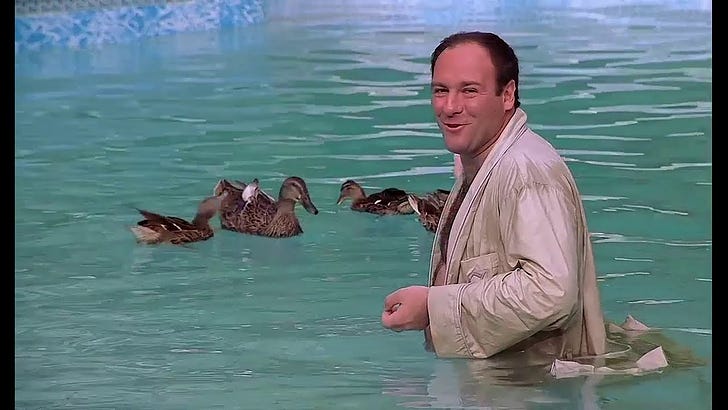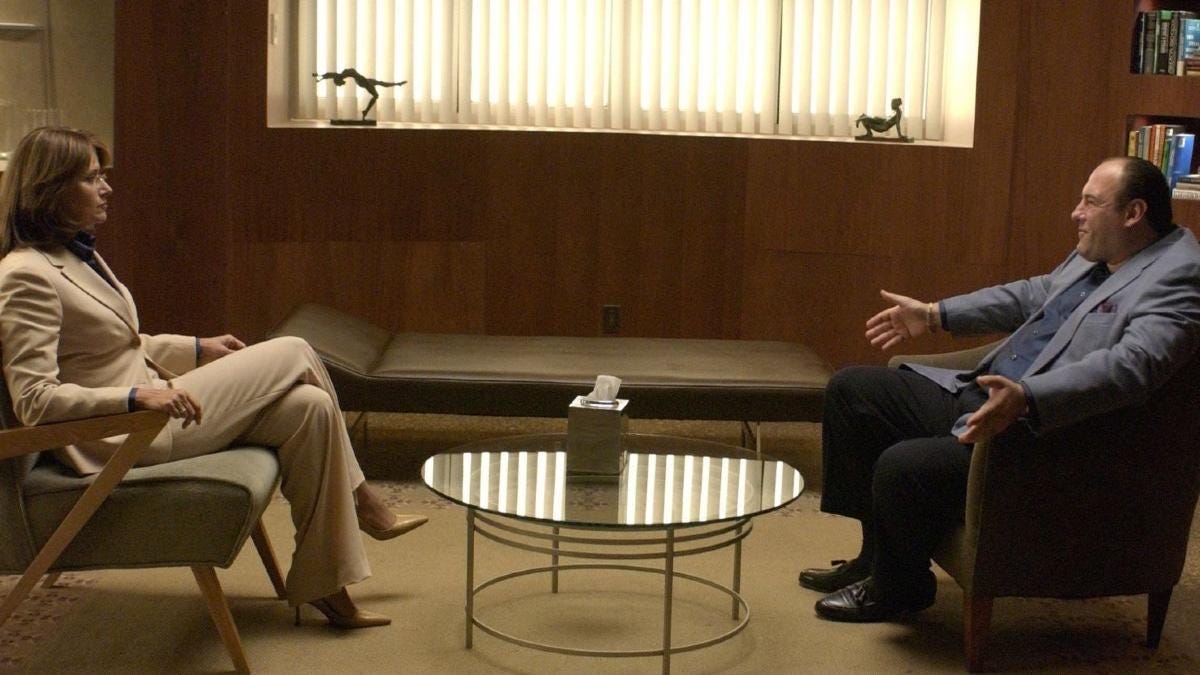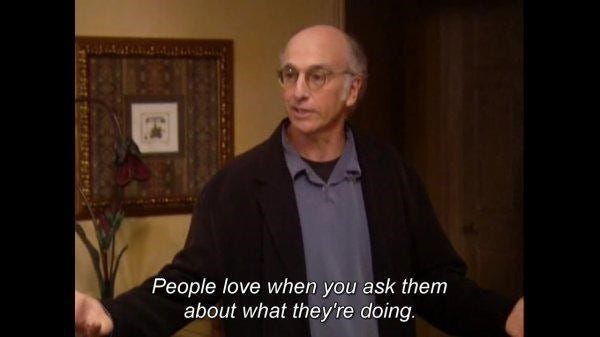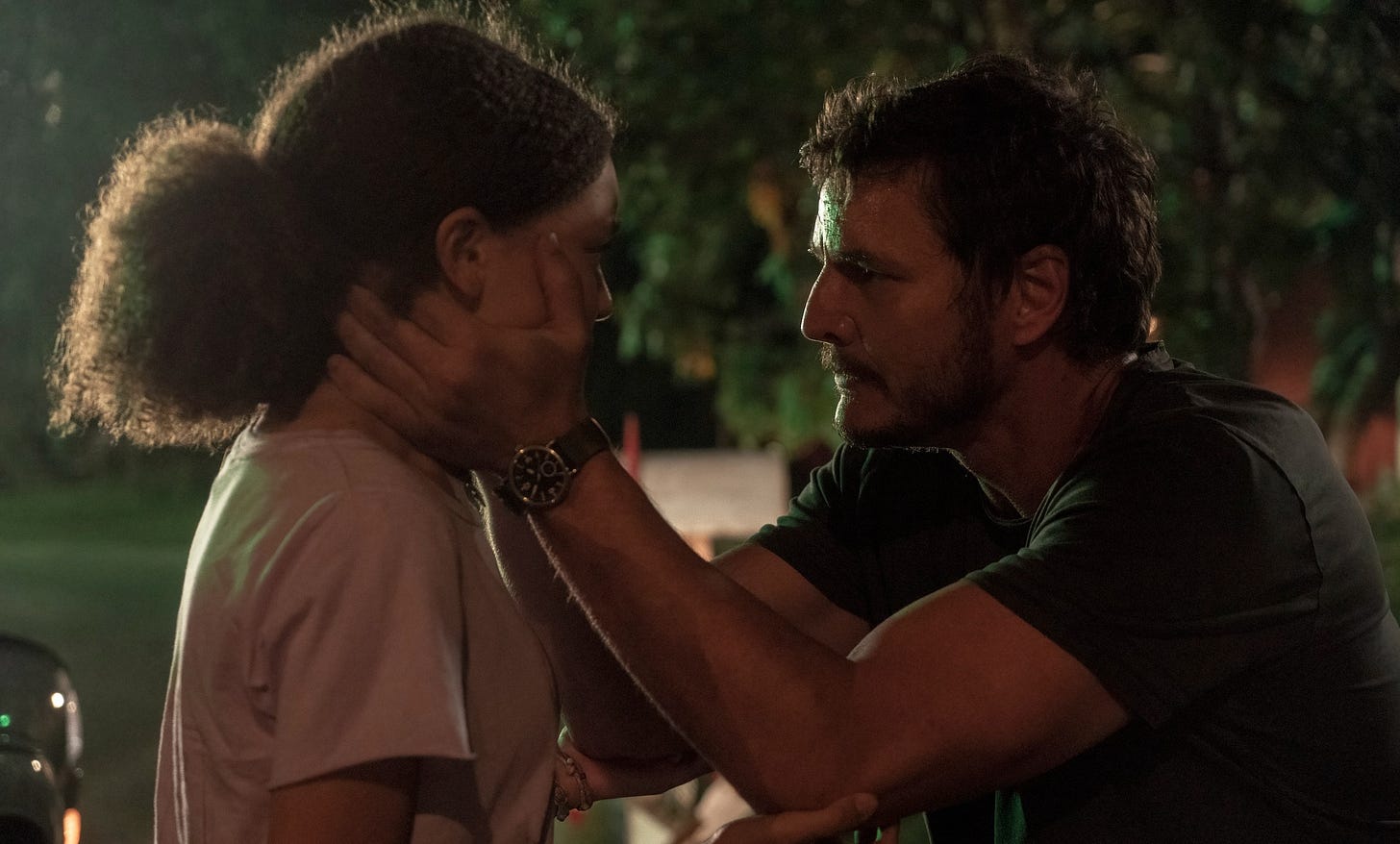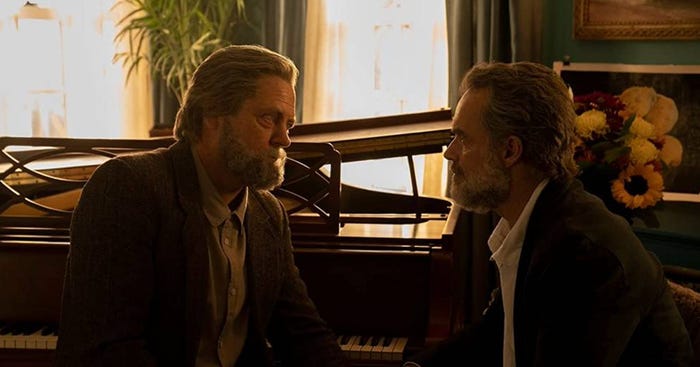#005 On HBO: The Sopranos, Curb Your Enthusiasm, The Last of Us
Evening Lazy people. This is the easiest title I've had to write. A few great pieces on a few heavy hitters.
Second Opinion: Tony Soprano and Dr Melfi
by Liam Turner
It’s HBO week, and I’ve given myself the mammoth task of writing about the greatest of all time, The Sopranos. There’s a bucket load to talk about when it comes to the Sopranos, as the two other lazy men know when I go off on a Sop-based rant two pints down at the Coopers. I’m feeling the pressure to give this masterpiece the credit it deserves. So, to keep focused, I’ve chosen one aspect of the show to discuss.
It’s probably my favourite.
The relationship between Tony Soprano and his therapist, Dr. Melfi. It’s creative genius. Such a fascinating aspect of the show—I mean who gives a mob boss a therapist? A window into the conflicted psyche of a mob boss for some viewers makes the man more relatable, as he talks about the same issues many middle-aged men face. The wife, the kids, and work stress—but on another level. It takes the mob boss to different levels and creates one of the most complex and interesting characters we’ve ever seen on our screens. So grab a couple slices of gabagool and enjoy a breakdown of the brilliance of David Chase, James Gandolfini, and Lorraine Bracco.
David Chase’s idea of having a mob boss go into therapy was initially earmarked for a movie. Chase always wanted to be a movie director but was struggling to break into the scene and thought this would be his ticket. Fortunately, his manager encouraged him to team up with HBO, before they were the highfliers they would become, to turn this idea into a TV program. And so, the Sopranos was born—a mafia depiction so realistic that the actual mob thought they had a connected guy on the inside. The scenes with Dr. Melfi divide opinion in the Sopranos community. Some, like myself, love them. To me, they provide greater depth to the character and help us understand Tony as a father, a husband, and a mob boss. Even James Gandolfini himself said, “I think those scenes made the show." However, others find them boring and even go as far as skipping these scenes (a sackable offense). These people clearly have no appreciation for character development and just want to see people shoot each other. Go and watch a Marvel film and leave the real TV to the rest of us.
Tony opens up in these therapy sessions, but Gandolfini portrays this in a way that doesn’t make it overly sentimental. Instead, themes of tenderness within a man who constantly needs to come across as tough and unapproachable are prodded and poked at by Melfi, who, interestingly enough is modelled off of David Chase’s real therapist, adding to the authenticity of these interactions. Tony discusses what he can about his line of work during these sessions, but also reveals key aspects of his personality that have been shaped during childhood. This is what makes the character likable. Too many crime stories only portray the main character through their actions. The Sopranos goes deeper, with these therapist interactions uncovering Tony’s own insecurities.
But does this make Tony any less intimidating, even to the audience? Absolutely not! You still wouldn’t fuck with him. With a temper like the incredible Hulk and the ability to lose it over something as small as orange juice with pulp in, even though the audience sees him at his most vulnerable, not a single person would want to get on his bad side. Despite all of this, the audience is still drawn towards a fragmented love for Tony. He wasn’t your usual ruthless mafia boss. To the audience, at times, he’s just a regular father caught up in this life. This is the beauty of the program, a formula that has since been copied by other shows. The audience loves Tony and want to see him win, but are brutally reminded of his violent, amoral, often racist, and somewhat sociopathic tendencies that have you questioning, “Why did I ever like this guy?” Tony’s character is summed up through contradictions. He is caring but violent, calculated but impulsive, loved but alone, and responsible yet irresponsible all at once.
The conflict is even seen within Dr. Melfi herself. In a self-aware twist, at one point in the series, Tony calls out Melfi’s obsession with him. Making the point that most people, let alone self-respecting professionals would cross the street to avoid someone like Tony Soprano. His reputation precedes him; Soprano is a household name in the New Jersey streets, and, to the public, he’s a ruthless mafia boss who leads with an iron fist. So why does Melfi jeopardise her professional reputation with this guy? Because she’s like every single one of us watching. She’s fascinated, scared, and, ultimately, addicted to him. Like the audience, she enjoys the thrill of peeking into Tony’s world and doesn’t know whether she is charmed or disgusted by the man sitting opposite her. In this instance, and many others, Dr. Melfi mirrors what the audience thinks and feels about Tony Soprano.
Tony’s relationship with Dr. Melfi is the best way for himself and the audience to understand his deep-rooted trauma and why he hates the world and himself. However, uncovering themes similar to those in A Clockwork Orange, is it really possible for a man like Tony Soprano to just ‘change’? At times, the therapy feels like an exercise in futility. Due to his profession in the ‘waste management industry’, it’s not possible for him to fully engage with therapy. Not only can he not disclose key parts of his life to Dr. Melfi, but defensive mechanisms such as rage and violence prevent him from facing the reality of his actions and behaviours. As soon as you feel like he starts to make progress, Melfi tries to highlight the contradictory life that Tony lives, then they are back to square one. Tony loses his temper, calls off the therapy then has a panic attack. However, to cut Tony some slack, he spent his whole life building up this ruthless ‘hardman’ persona that is used to protect the interests of the mob, as well as his family. He can’t now go crying about how his mother mistreated him as a boy. He would look weak, and rivals would take advantage of this. For this reason, he not only has to hide his therapy from the people he calls ‘family’, but it also makes the decision to go into therapy a responsible yet irresponsible decision and prevents any real change in happening.
Let’s take one of the key themes in the therapy sessions, rejection. Tony clearly has a fear of rejection, coming from his cow of a mother. Every Sopranos fan hates Tony’s mum. “I wish the Lord would take me now." Trust me, so do we. She’s manipulative, dismissive, and never shows Tony the love a mother should show her son. She even teams up with Tony’s uncle, Junior Soprano, to put a hit out on him. In her eyes, everything he does is wrong, and it creates an instinctive need for validation within Tony from a young age. So, Tony seeks this validation from other women, often having multiple comare’s to replace the emotional neglection from his mother with physical affection from a multitude of women. So, when Dr Melfi shows Tony a level of compassion, love, and understanding, inevitably he mistakes this for affection and makes a move. Yes, he actually tries to fuck his own therapist. When things go wrong, he reverts back to the emotions and behaviours of his childhood and storms out of Dr. Melfi’s office. Usually, this rejection would ignite feelings of rage, and manifest themselves into acts of violence, but because he sees Melfi as a mother figure, he feels powerless to act, and instead puts up an emotional shield and leaves the therapy session.
It would be remiss of me not to mention the ducks. In season 1, a mother duck decides to raise her ducklings in Tony’s pool, and he couldn’t be happier about it. Tony was content with life when the ducks were around. However, when the ducklings grow wings and leave the nest, Tony’s feelings of depression and emptiness come flooding back, as do his anxiety attacks. The ducks personify Tony’s deep-rooted issues. When the ducks choose to give birth in his garden, it validates the feeling that he has built a stable and safe family home, but when the ducks leave, the feelings of rejection and fear of losing everything he loves (a fear that is always lurking around the corner in his line of work) come flooding back.
It’s literally impossible for me to sum up the complexity of Tony Soprano’s character in one short article, and it took me an embarrassing amount of time to even come up with what I’ve given you. Writing about the Sopranos is a poison chalice for me. I love it, and I feel like I could ramble on forever, but believe me, nobody wants to read that.
Larry David Doesn’t Care
by Harry Meadows
A year after Seinfeld came to an end, HBO aired a special from its co-creator, Larry David: Curb Your Enthusiasm. The hour-long programme follows a fictionalised version of David as he builds towards a return to stand-up comedy, in the form an HBO special.
A year later, the first season of Curb Your Enthusiasm aired, with a ten-episode run. The twelfth and final season aired earlier this year and ended the most cringe-inducing programme on television, and what is probably the network’s most successful comedy.
The basis for its success lies in it laying bare the most awkward and inappropriate human instincts. There are shows like It’s Always Sunny in Philadelphia that have found the funny in exaggerated pastiches of human behaviour, but with Larry David, you always feel that it might not be a joke.
The show’s dialogue is unscripted, allowing Larry to unleash his anti-social instincts, leaving the other cast members to play along. I get a lot of joy out of Jeff Garlin in the show, who plays Larry’s manager. He is often the sounding board for Larry’s bemused takes on the world around him and his frequent partner in crime for various hijinks; from helping to swap his daughter’s doll’s head or hide the body of a bludgeoned swan. He also frequently seems on the brink of laughter and struggles to hold back his amusement at some of Larry’s more unexpected outbursts.
The fun of the show can be found in its unpredictable and often hilariously blunt dialogue. As Cheryl Hines, who plays Larry’s wife, says, ‘Larry does all the things that we want to do, but don’t, because it’s social suicide.’
During one of many interactions at the golf club, Larry is asked if he can pray for this guy’s father, who isn’t doing so well. He says no. Of course, the guy is offended and says it could be Larry’s prayer that saves him, to which Larry responds with the sarcasm that most of us would be itching to employ, against our better judgement. To write it out would do it an injustice, but you should fin the clip after you finish the Lazy Man.
We love seeing the ridiculousness of the social conventions that we all follow exposed. Tearing these social niceties to shreds is a great tonic for the frustration that can build up because of our daily interactions.
As is often the case, nothing ever goes quite as smoothly as it should in the world of Curb. At one point, Larry is getting into the swing of things with a woman he has lusted over for a while, when he spots a framed picture of George W. Bush on her dresser.
The unexpected appearance of the 43rd POTUS is funny, but David’s rejection of her because she is a Republican is a great example of why the show has had such cultural success. These small acts of rebellion that we indulge in when we have moments to ourselves are all played out and we can enjoy these misanthropic endeavours from the safety of our sofa.
Like all the best satires, its legacy can be seen in its adoption in popular culture. The theme to Curb Your Enthusiasm is synonymous with social faux pas. The show, of course, takes it to its comedic extremes, but it taps into the uncomfortable aspects of sharing the world with other people, by stripping away politeness in the face of ignorant or unreasonable behaviour.
Inevitably, Larry’s lack of patience in his daily ordeals forms the plot of most episodes, as his behaviour always leads to disaster down the line. We are always sympathetic to him, however, because we see the strange humanity in his actions.
There is an early episode of Curb that perfectly encapsulates all there is to love about the series. Cheryl and Larry learn from a friend, whose relative supposedly works in the secret service, that there is going to be a terrorist attack in LA that weekend. Cheryl has a big fundraiser planned for her charity, with Alanis Morisette playing, so she asks Larry to stay in town with her, as, after all, if the worst were to happen, it would be better if they went together. Larry doesn’t agree. He thinks it's ‘kinda selfish’.
Deciding it’s more hassle than it’s worth, Larry agrees to stay in town and go to the fundraiser. But he has also offended their friend, Mindy, when he doesn’t speak to her at dinner, so he uses the secret about the attack as leverage to patch things up. Mindy tells Larry that she has really misjudged him and praises him for staying behind to go to the charity night.
It’s all looking rosy for Larry, until of course, Mindy spills the beans and mutual friends are offended by Larry not telling them about the attack. In true Larry David style, he fails to reconcile and doesn’t invite them to the fundraiser, which has had to be moved to the David’s house, because now the whole of LA has heard rumour of a terrorist attack.
Their disgruntled friends drive furiously to the house and crash into Alanis Morisette on the way, who then must perform in a neck brace and the evening is ruined.
Everything from the painful honesty to the sly leverage for an easier life captures all the thoughts and behaviours that we don’t want to admit to ourselves, but that we instantly recognise. We have all felt the smug satisfaction that Larry felt when he left that secret with Mindy, just as we have felt the sharpness of our actions coming back around to bite us on the arse.
If you don’t see this is in yourself, you’re either Jesus Christ or a liar. And it’s the exposure of these liars and messiahs in the triviality of the everyday that gives the show its sardonic brilliance.
Pretty good. Pretty, pretty good.
Game Stories Matter: The case of The Last of Us
by Tom Mancini
Have you seen Resident Evil?
Yeah, neither have I.
The game slaps, the film sucks.
Released in 2002, it’s a live-action romp through Racoon City, the home of the original trilogy. Per Rotten Tomatoes, it’s ‘loud, violent, formulaic and cheesy’ – a far cry from the intense, paranoid horror of one, two and three.
But then again, this was the ‘00s. Nothing was expected from a video game adaptation. They were all show, no substance.
The same goes for 2001’s Lara Croft: Tomb Raider, starring Angelina Jolie. According to Todd McCarthy of Variety, it’s ‘far less imaginative, and quite a bit more stupid, than the interactive game it’s based on’.
Clearly, nuance wasn’t on the cards for directors Anderson and West. Given the perception of video games at the turn of the century –a hobby for goons, geeks, losers and layabouts – it wasn’t the place to find great narratives like American Beauty and A Beautiful Mind.
Who cares when you’re making dough? Resident Evil and Tomb Raider were a success at the box office, from a shareholder perspective, anyway. They’re amongst the highest grossing video game adaptations to hit the silver screen, with the former making $103 million worldwide, and the latter $275 million.
As I’m sure you can guess from the quotes I’ve pulled out, they didn’t receive the same love from the critics. Sifting through the reviews, you notice a trend – they’re ‘cheap’, ‘preteen’, ‘cliché'… ‘silly’.
It's this concept of 'silly' that really irks me. I feel like it dismisses the legitimacy of games media. Unlike books or biopics, video games are like the Sideshow Bob of film and TV. Look at Uncharted, Assassin's Creed, Hitman – they're 'flicks', IPs to cash in for a quick buck.
I've seen the former – they cast Tom Holland as Nathan Drake, and Mark Walberg as Sully. Take a moment to google the characters. Do a side by side. There's no respect for the source material. They look stupid in the posters, too.
20 years on from the first movie and not much had changed in the RE universe. In 2022, the Resident Evil TV show released on Netflix to middling reviews – Rotten Tomatoes said ‘it could use some more brains’ drawing parallels to the films of old. To make matters worse, the show was canned after one season. Over $313 million dollars has been spent adapting Capcom’s opus, with eight (yes, eight) separate features put to film.
It's not entirely the fault of publishers and directors. Adapting a video game is something of a poison chalice. You need to make the narrative accessible, whilst pleasing the old guard. Undoubtably, there’ll be some success – if you love the game, you’ll watch regardless. But mess it up and it’s the guillotine. For a director, I’d imagine it’s a little like managing Chelsea.
Craig Mazin, writer of Chernobyl, gives good insight into the problem of adaptation. Speaking to British GQ, he says:
'It’s ironic that in a medium where technology has progressed so rapidly and incessantly, the narratives so often feel 8-bit. That’s not because of lack of plot. Video games have been drowning in plot for years. The problem was always the lack of compelling characters.'
Might this be the problem? It's harder to give depth to swashbuckling adventurers like Nathan Drake, and lawless killers like Agent 47. If you play into the action, at least you don't have to write characters of your own.
Is this still the case? Are we doomed to watch Mark Wahlberg in an Elder Scrolls adaptation?
In the case of the Borderlands movie, probably.
Yet, thanks to a handful of networks, studios are starting to work out that there's more to these licenses. HBO is part of the vanguard, with its adaptation of The Last of Us, Naughty Dog's post-apocalypse narrative.
The Last of Us is by no means perfect. To paraphrase Australian critic Skill Up in one of the latest episodes of Friends Per Second, it's good, but feels like a rehash of the original story without much variation (or adaptation, I should say). Given how much gravity the game had when it first released – it was a favourite of Youtubers like PewDiePie back in 2013 – it's hard not to feel like we've heard it all before.
But to a mainstream audience, it's showing these stories can have legs.
I watched the first episode with my Mum and Dad. They could hardly play a game of Tetris if I asked them to. But the story gripped them both. How did I know? Dave (Dad) didn't fall asleep. That's the Mancini equivalent of a chef's kiss.
I'll be the first to admit, this intro was made for TV. It's perfectly paced, highly cinematic, and incredibly linear, so most if not, all players had the same experience. Game director Neil Druckmann's opening pulls on the heart strings, so it's not hard to get invested. But it's also the case in episodes that adapt open sections of the game.
The third episode, 'Long, Long Time', is The Last of Us at its finest. It's a spin on the story of Bill, an in-game character known to the player as a solo survivalist. On PlayStation, he's still alive – interact with him as part of Chapter 4, 'Bill's Town'. But in the show, we're given an all-new story surrounding his life post-cordyceps.
Enter Frank, Bill's lover. To fans of the game, this is completely left field. Bill was never intended to be this important. But that doesn't matter in the slightest. The hour we spend with the pair is funny, charming, heartbreaking – it shows a human relationship blossoming when humanity is on its knees. And it tells us the power of this world, built for a PS3 controller – that it can build us up, break us down, and invest us entirely.
Unfortunately, I don't have the time to explore the relationship between Pedro Pascal's Joel and Bella Ramsey's Ellie. Theirs is a complicated, mish-mash father-daughter relationship. These are characters who Mazin believes are 'worth stopping for'. Probably why he involved himself as a co-writer for The Last of Us.
With part 2 on its way (season 2, I should say), hopefully The Last of Us is a sign that video games are worth buying into, and not just for big budget boom booms.

